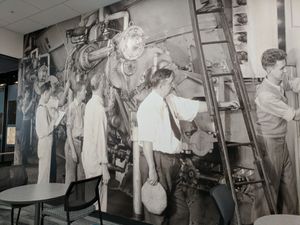We have become used to thinking about digital preservation as an issue. We don’t tend to think of print preservation in quite the same way. Several things have come over the horizon recently which have made me think about this issue a little differently:
- I have been involved in several discussions around the mass digitization projects – OCA and G5. I have also participated in some discussion about appropriate disposition of off-site storage facilities and how those might be better articulated within some overall pattern of provision. In this context there has been some discussion of the cost of managing print collections over time.
- Chris Rusbridge has a provocative short article on digital preservation in the current issue of Ariadne where he wonders how we can suggest that the putative costs of digital preservation are high when compared with the actual cost of preserving print collections.
- I noted the useful UK report a while ago which looks at models of shared repositories: Optimising Storage and Access in UK Research Libraries. A report for CURL and the British Library. September 2005. [pdf]
The historic library model has been physical distribution of materials to multiple locations so that they can be close to the point of need. In the network environment, of course, this model changes. Resources do not need to be distributed in advance of need; they can be held in consolidated stores, which, even with replication, do not require the physical buildings we now have. As we move forward, and as more materials are available electronically, we will see more interest in managing the print collection in a less costly way. This discussion is starting, as I note above, in relation to the mass digitization projects and the heightened interest in off-site storage solutions: in developing a set of consolidated stores. In each case, there is a growing interest in being able to make investment choices which maximize impact – based, for example, on a better understanding of what is rare or common within the system as a whole, on what levels of use are made of materials, and so on. In fact, again looking forward some time, it would be good to have management support systems in place which make recommendations for moving to storage or digitization based on patterns of use, distribution across libraries, and an agreed policy framework.
There are two medium term questions that are of great interest here. First, what future patterns of storage and delivery are optimum within a system (where a system may be a state, a consortium, a country). Think of arranging a system of repositories so that they are adjacent to good transport links for example, collectively contracting with a delivery provider, and having better system support for selection for moging to the repositories, and monitoring traffic between the repository and libraries. And managing this alongside growing digitization activity.
Second, think of preservation. Currently, we worry about the unknown long term costs of digital preservation. However, what about the long term costs of print preservation? I contend that for many libraries they will become unsustainable in the current model. If the use of large just-in-case collections declines, if the use of digital resources continues to rise, if mass digitization projects continue, then it becomes increasingly hard to justify the massive expense of maintaining redundant collections. Long-term we may see a shift of cost from print to digital, but this can only be done if the costs of managing print can be reduced, which in turn means some consolidation of print collections, and a shared approach to their preservation.
In this way, the management and preservation of the collective print collection becomes more of an issue. In time, even, it may become an overwhelming issue in the way that preserving the digital record now seems.



